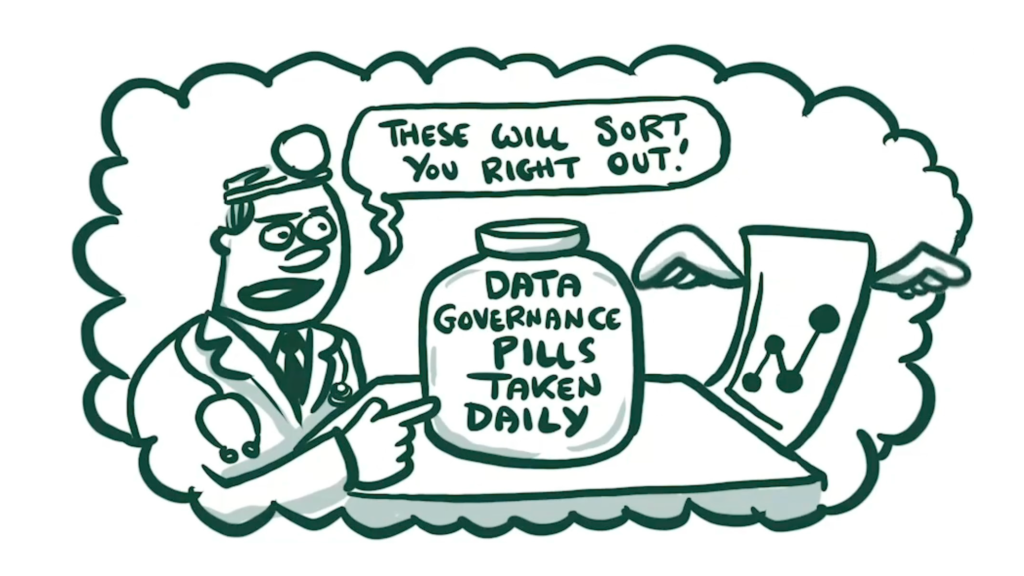Data Culture Change: the importance of ‘Why?’

Author: Paul Wandless
“Trust in Data… is it still an attractive subject for boards and execs to go back and think about, is our data right, is it safe? Or, have we moved on from that and we’re now all about exploitation? I have a hypothesis that people that revisit their data management and data quality programmes now will find them unfit for the AI age.” — The musings of data sage, Barry Panayi, who co-presents the Data Files podcast.
Barry Panayi has served as Chief Data Officer at some of the most well-known brands in Britain and is a force of nature in the data world. He raises two key questions that many organisations continue to grapple with. How do you achieve ‘Trust in data’ at a time of stampede towards the potency of AI and is this new era of automation going to place data governance back in vogue?
Having worked with a number of financial and healthcare institutions over recent months and years, it would appear that the age-old practice of ‘data wrangling’ spreadsheets is still as prevalent as ever. How dispiriting for staff up and down the country trying to make key business decisions, to find the data on which they’re basing those decisions incomplete or inaccurate. I wonder what the overall impact on the UK’s productivity is of not trusting the data and the industry it then takes to achieve the required trust.
Investing in data culture and literacy to gain the benefits of AI
As organisations begin to institute policies and guardrails around generative AI, the more visionary led organisations are concurrently investing in changing their data culture and improving data literacy within their enterprises, especially those with more data savvy regulators to answer to. They realise that their ambitions to become ‘data enabled’ can be thwarted by the basics of staff behaviour around data, so they’re investing in programmes of both education and persuasion.
But how do you create something that really engages staff about data? Let’s face it, you mention the words ‘data training’ to people and you can almost see the energy drain from their faces. It’s often viewed as a ‘tick box’ exercise, something to be tolerated, delivering the ‘what’ in a way that’s invariably instructive and ‘tell’ in character.
The importance of the “Why?” in data culture engagement
Perhaps for organisations to achieve better and more trusted data, they need to properly engage their staff on why data matters, connect them to the downstream consequence of both good and bad data management in a compelling narrative that’s bespoke to their organisation.
Another leading data figure, Steve Green who was formerly Chief Data Officer at the Financial Conduct Authority has a very real example of the positive impact of this approach.
He’s currently Chief Data Officer (CDO) at a Global Investment Bank where he and his team have recently deployed a different training method to support a change in data culture.

The Data Files podcast is about the challenges of leading around data
What the CDO of a global investment bank has done to get staff to care about data
“What we were looking at doing is really trying to encourage and inspire the organisation to care more about data, and for staff to reflect upon, actually what could it do for me going forward. And for that, you’ve got to explain a story in a narrative that links Data Governance and links Data Quality, to all the decisions they make every day in their jobs.”
He takes the view that in order for staff to change their behaviour around data, they need to truly believe in the case for change, what it will mean for them, their colleagues and the organisation they work for. The training programme he and his team pioneered is an immersive journey for staff to experience, an attempt to access and influence their belief systems.
A convincing case for change
The programme includes animation, quizzes, narratives that are bespoke to the organisation, memorable metaphors and videos of key departmental leaders explaining why data matters to their function.
Green continues, “The feedback has been really positive about how engaging it was, how it carried across messages in a way that wasn’t just PowerPoint wasn’t just a kind of tell activity, we got a level of engagement that is way beyond what we normally see from training activity. The organisation now does care at every level about data and this training has helped to get us there.”
There’s certainly something very compelling and persuasive about a united leadership team all explaining in their own way what an opportunity better and trusted data is and what a challenge poor data behaviour presents. If nothing else, it signals that the leaders and sponsors are profoundly serious about changing data culture and that the right behaviour has huge upside implications for the enterprise and the careers of those within it.
As the AI juggernaut gains speed and the pressure to automate builds, how curious that something so advanced could be jeopardized by something so foundational. Good to know that some of our best data leaders are tackling this intractable problem with a more sophisticated and multi-dimensional approach.
Data Culture programmes that work
If you’d like to learn more about programmes that can yield behavioural change in support of better, more trusted data, then please watch this short promotional video or contact us directly.
More on Data Culture
- Data capability realisation
- Data resourcing
- Data: Ask the community
- Data Navigator
- Data
- Data Files Podcast
- Who should lead data strategy?
ABOUT PRACTICUS
You can find out more about us on the about us page
